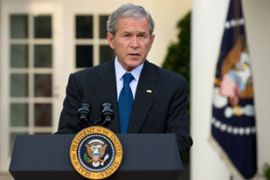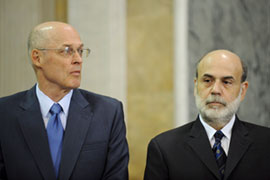US to buy stakes in major banks
Government to use up to $250bn to buy shares in ailing financial institutions.

“These measures are not intended to take over the free market, but to preserve it,” Bush said.
Executive pay limited
Nine banks have agreed to join the government programme, including Citigroup, Goldman Sachs, Morgan Stanley and Bank of America.
Banks joining the programme will have to agree to limits on executive pay and other benefits, Henry Paulson, the US treasury secretary, said.
 |
| Paulson, left, has defended the intervention as a necessary if objectionable action [EPA] |
Other banks will have an option to accept the programme, in which the government gets “senior preferred shares” which the treasury says will not give them voting rights.
“Today’s actions are not what we ever wanted to do,” Paulson said, delivering his comments alongside Ben Bernanke, the Federal Reserve chairman, and Sheila Blair, the head of the government’s Federal Deposit Insurance Corp.
“But today’s actions are what we must do to restore confidence to our financial system.
“Government owning a stake in any private US company is objectionable to most Americans – me included – yet the alternative of leaving businesses and consumers without access to financing is totally unacceptable.
“When financing isn’t available, consumers and businesses shrink their spending, which leads to businesses cutting jobs and even closing up shop.”
Market rallies
John Terret, Al Jazeera’s correspondent in New York, said the changes were “pretty momentus … the whole landscape is really changing”.
He said the plan “marked a change in strategy for the US bailout” and added there would be “consderably less risk-taking after the government takes a stake in the banks”.
| IN DEPTH | ||
|
|
“Instead of putting all that money into buying the illiquid assets that are held by banks and other companies, they’re going to do what the Europeans have done – and the British as well,” Terret said.
“That is, they will inject money directly into the banks by buying up preferred shares and the government will get an interest payment on those preferred shares.”
The Dow Jones industrial average closed about 76 points, or around one per cent, lower at 9,310 – a day after its 936-point jump.
Profit-taking had taking started creeping into the market after the Dow surged more than 400 points at the opening.
Stock markets in Europe, however, saw gains on Tuesday, recovering from severe losses incurred over the past week.
Britain’s FTSE closed 3.2 per cent up, Germany’s DAX rose 2.7 per cent, and France’s CAC added 2.8 per cent.
The stock exchange in Iceland, which is teetering on the edge of bankruptcy after its financial sector crashed, opened on Tuesday with a 76 per cent loss, but the massive drop was due mainly to the removal of three ailing banks nationalised last week by the Icelandic government.
When adjusted to reflect that, the index showed only a 0.5 per cent loss.
Asian stocks
The gains in Europe’s major indices came after Asian stock markets rallied for a second straight day following schemes by Western governments to give cash to ailing banks in an attempt to encourage bank-to-bank lending.
The Japan’s Nikkei index closed 14.15 per cent up on Tuesday, its biggest-ever gain in a single day’s trading.
 |
| Banks that get bailout cash will have to agree to limits on executive pay [GALLO/GETTY] |
Tuesday’s gains erased most of the losses the Nikkei took on Friday and went some way towards reversing the 24 per cent plunge it has suffered over the course of the week.
Hong Kong’s Hang Seng index closed 3.2 per cent higher while Australia’s benchmark S&P/ASX 200 index climbed almost six per cent before paring some gains.
All bank deposits in Hong Kong will be fully guaranteed until 2010, John Tsang, the territory’s financial secretary said on Tuesday.
Australia’s government unveiled a A$10.4bn ($7.3bn) emergency stimulus package on Tuesday to guard the country’s economy from a global recession.
The move to make one-off state payments to low-income earners and pensioners came two days after the government guaranteed all bank deposits for three years.
It also made wholesale funding to Australian banks to protect them from the fallout from the global credit crisis.
‘Virus killed’
Following Europe and Asia’s strong stock market performances Jamie Chisholm, a journalist for the Financial Times, said it appeared that the immediate banking crisis had been stemmed.
“We have killed the virus, but the problem now is that we have to deal with the infection. The infection is the effect that all this has had on Main Street; people who go about their daily lives [and] businesses who make and produce things,” he told Al Jazeera.
“We are going to be faced with at least a downturn, maybe a recession, possibly a technical global recession. Once this market bounce has sorted itself out, the markets will look to that [possibility].”
“This sort of [crisis] has not happened to such a degree in the past – everyone gives the example of the 1930s but this is very different from then.”
Arab stock markets also rose on Tuesday, with emirate Dubai gaining nine per cent at the opening of trade and Abu Dhabi and Oman each gaining six per cent.
The jump in Gulf markets came after the United Arab Emirates announced that it had set aside $19bn for local banks to encourage bank-to-bank lending and stave off a credit freeze.
The funds bring the total amount set aside by the UAE in the last month to prop up banks to $32.6bn.
Government intervention
The markets’ surge follows co-ordinated moves over the weekend by European nations including the UK, France, Germany and Italy, to firm up banking systems.
Walden Bello, a senior analyst and former director of Focus on the Global South, said that a complete overhaul of the global financial system was needed to restore people’s trust in it.
“I think we are talking about drastic overhauling and the reinstitution of capital controls. The lifting of those controls between countries and financial sectors has been one of the causes of this financial mobility that has brought us 100 crises over the past 25 years,” he told Al Jazeera.
“I think we are going to be talking about severe regulation of the banking sector. Among this will be the banning of trading in derivatives, which Warren Buffet [an American investor and businessman] has called a financial means of mass destruction.
“I think we need to bring a whole new social criteria, in terms of lending and financial operations, [which] will mean channelling money into health and things like that.”
